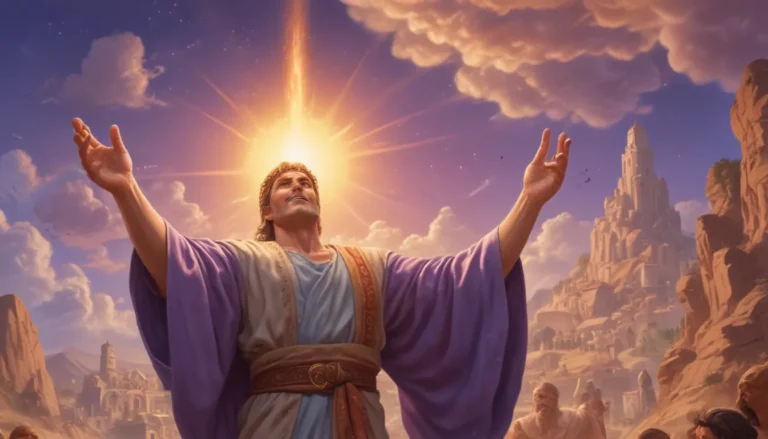
In many cultures and traditions around the world, lightning bolts hold a significant spiritual meaning that goes beyond their literal interpretation as natural phenomena. This fascinating symbol has been used in various ways by different civilizations throughout history to represent power, protection, and guidance. In this post, we will explore the spiritual meaning of lightning bolts and delve into some of the myths, legends, and beliefs associated with them.
Lightning Bolts as a Symbol of Power and Protection
One of the most common themes associated with lightning bolts is their representation of power and protection. In ancient Greece, the god Zeus was known for wielding a lightning bolt as his primary weapon. The lightning bolt symbolized his authority over the sky and his ability to control storms. In many cultures, lightning bolts are seen as divine messengers sent from the heavens to protect or punish people on earth.
Here’s a list of other cultures where lightning bolts serve as symbols of power and protection:
- Norse mythology: Thor, the god of thunder, wielded a hammer that created lightning bolts as his weapon of choice. His hammer was seen as an emblem of strength and justice.
- Native American cultures: Lightning bolts were often associated with the thunderbirds, powerful spirits believed to protect tribes from harm.
- Celtic mythology: The Celtic god Taranis was known for controlling storms and wielding lightning bolts as a symbol of his authority over nature’s forces.
- Hinduism: Indra, the god of thunder and rain, used a weapon called the Vajra or “thunderbolt,” which symbolized divine power and protection.
Lightning Bolts as Guidance and Enlightenment
Lightning bolts also hold spiritual significance in the context of personal growth and self-discovery. In many cultures, lightning was seen as a sign from the gods, providing guidance during challenging times or offering insight into one’s destiny. For example, Native American tribes believed that seeing a lightning bolt could be an omen of significant life changes, either positive or negative.
Here are some examples of how different traditions interpret lightning bolts as symbols of guidance and enlightenment:
- Buddhism: In Buddhist teachings, the concept of “Vajra” symbolizes indestructibility and clarity. It is often associated with the lightning bolt and used as a meditation tool to help practitioners attain inner peace and enlightenment.
- Christian tradition: Lightning bolts are sometimes used in religious art to represent divine power, wisdom, or revelation. For instance, the Archangel Gabriel is often depicted holding a lightning bolt as a symbol of divine inspiration and guidance.
- Chinese philosophy: The concept of “Lei Feng” (thunderbolt) in traditional Chinese medicine refers to an energy pathway that runs through the body, connecting the spirit and physical self. This pathway is believed to play a crucial role in achieving balance and harmony within oneself.
Lightning Bolts as Symbols of Connection and Union
In various spiritual traditions, lightning bolts are seen as symbols of connection and unity between heaven and earth, or between different realms of existence. For example, in many Native American tribes, the thunderbird was believed to be a bridge between the human world and the spirit realm. By understanding this connection, people could seek guidance and protection from higher powers during challenging times.
Here are some other examples of how lightning bolts represent unity and connection:
- Ancient Egypt: The Ankh, an ancient Egyptian symbol representing life, often depicted a cross with a loop at the top that resembled a lightning bolt. This symbol was believed to connect earthly existence with divine realms, symbolizing eternal life and spiritual growth.
- Shintoism: In Japanese Shinto tradition, kami (spirits) are thought to reside in natural elements like mountains, rivers, and thunderstorms. Lightning bolts serve as a connection between these spiritual forces and the human world.
- Taoism: The Taoist concept of “Qi” (energy flow) is often visualized through symbols like yin-yang or the Bagua, which represent balance and harmony in the universe. Lightning bolts can be seen as a symbol of this energy flow, connecting different aspects of existence and maintaining equilibrium.
Conclusion
The spiritual meaning of lightning bolts varies across different cultures and traditions, but their symbolism often revolves around themes such as power, protection, guidance, and connection. Whether seen as weapons wielded by gods or as bridges between realms, these fascinating symbols continue to captivate our imaginations and inspire us on our spiritual journeys.
By exploring the many interpretations of lightning bolts throughout history, we can gain a deeper understanding of how different cultures perceive and interact with the natural world around them. As we delve into the rich tapestry of human experience, let’s remember that even something as seemingly mundane as a lightning bolt can hold profound spiritual significance for us all.





